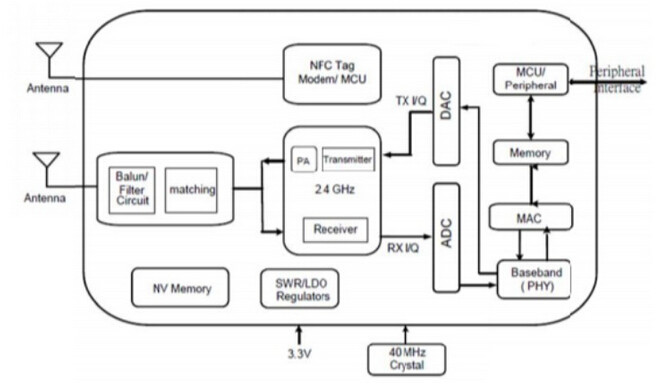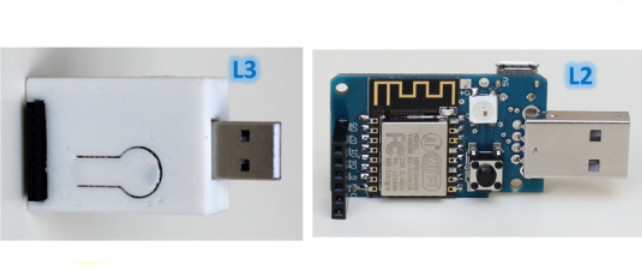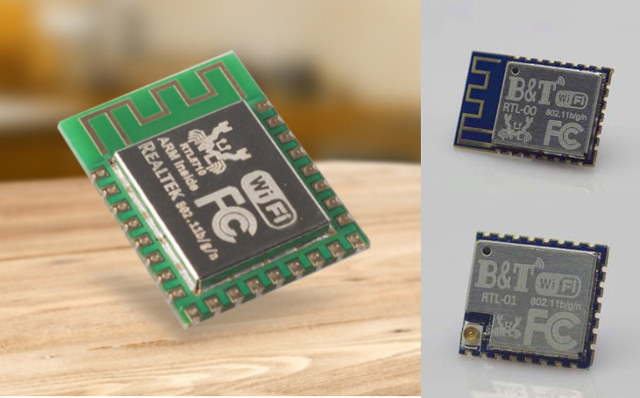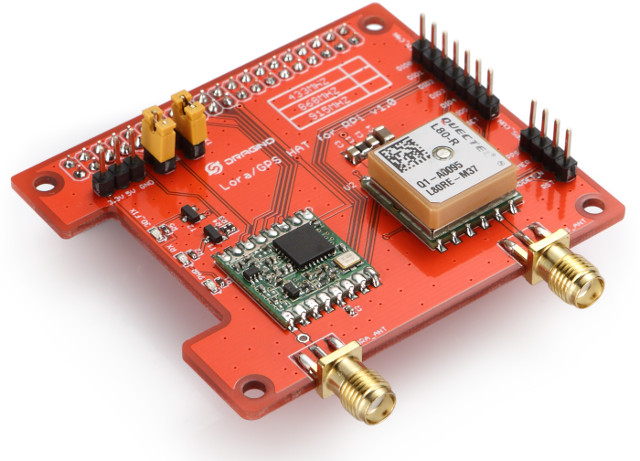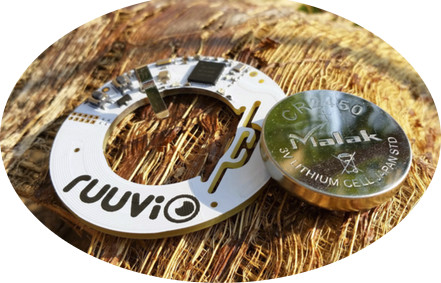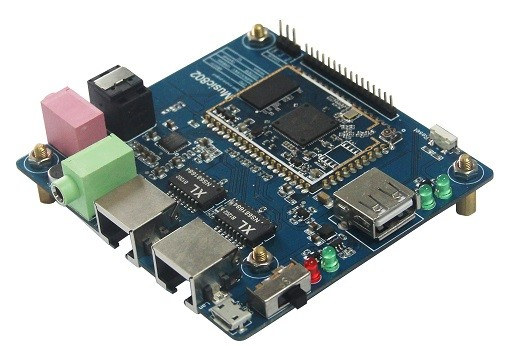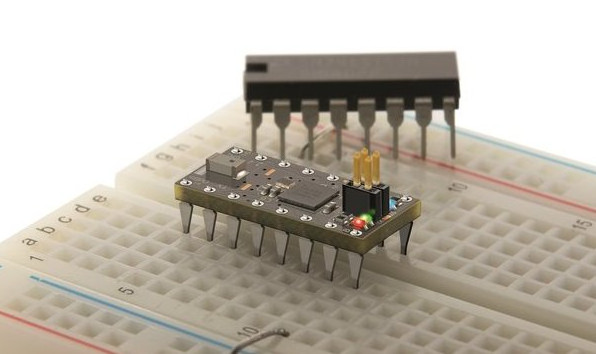Embedded Linux Conference & IoT summit 2016 first took place in the US in April, but the events are now also scheduled in Europe on October 11 – 13 in Berlin, Germany, and the schedule has now been published. Even if you are no going to attend, it’s always interesting to find out more about the topic covered in that type of events, so I had a look, and created my own virtual schedule with some of the sessions. Tuesday, October 11 10:40 – 11:30 – JerryScript: An Ultra-lightweight JavaScript Engine for the Internet of Things – Tilmann Scheller, Samsung Electronics JerryScript is a lightweight JavaScript engine designed to bring the success of JavaScript to small IoT devices like lamps, thermometers, switches and sensors. This class of devices tends to use resource-constrained microcontrollers which are too small to fit a large JavaScript engine like V8 or JavaScriptCore. JerryScript is heavily […]
Development Resources for Realtek “Ameba” RTL8710, RTL8711, and RTL8195 WiFi SoCs
We were made aware of a potential ARM based ESP8266 competitor last week with Realtek RTL8710 WiFi modules selling for about $3.5 shipped per unit, and under $2 per unit for larger orders (100+ pieces). Hardware is good, but for a platform to be successful, or even just useful, you also need software support. So I started doing some research into IoT-Tech BBS and asked ICStation for an “SDK” for the module they sold. I ended up on this forum post providing an “Realtek RTL8710 SDK” via Baidu (password: brwp), which turned out to be about the same as the Google Drive link provided by ICStation, and only contain minimal documents, as well as cracked Windows IAR Embedded Workshop and JLink tools. There are also some more technical details in Chinese only in another forum post, and well as B&T RTL8710 module datasheet (PDF). However, if you don’t read Chinese […]
vESPrino ESP8266 USB WiFi Dongle Supports Add-on Boards (Crowdfunding)
Last month, I wrote about WiThumb a USB WiFi adapter based on ESP8266 processor which can conveniently be plugged into any USB port for power and programming. However, the hardware design was questionable with the WiFi PCB antenna placed close to other components, and a temperature sensor likely to get pretty hot inside the case. There’s now another device based on a similar concept with vESPrino USB stick that also expose a few I/Os through its enclosure. ESPrino specifications: WiFi module – ESP-12 FCC & CE Certified module based on Espressif ESP8266 USB – 1x micro USB port, 1x USB port Expansion – 6-pin female header with 4 GPIOs, 5V and 3.3V Programming & debugging – Via USB through CH340G USB 2 Serial adapter Misc – Push button (GPIO0), WS2812b RGB LED (GPIO2), temperature sensor connected to ADC? (not visible on schematics) Power Supply – 5V through micro USB or […]
An Alternative to ESP8266? Realtek RTL8710 ARM Cortex-M3 WiFi IoT Modules Sell for $2 and Up
ESP8266 WiFi modules initially stormed the maker market for IoT applications thanks to their low price, and later it became the dominant WiFi IoT platform for hobbyists thanks to its large community of developers. But technology progresses over time, and it’s always fun to look out for new solutions, and Realtek RTL8710 could prove to be an interesting alternative with its ARM Cortex-M3 processor @ 166 MHz, a little more user memory (48KB), audio support, faster WiFi performance, while still keeping a low price, as modules can be purchased for $3.90 on ICS station, a little more on eBay, and as low as $1.95 per unit on Aliexpress including shipping if you purchase 100 pieces or more. A Chinese website as a side-by-side comparison between Realtek RTL8710 and Espressif ESP8266, which I also found translated into English. Realtek RTL8710 Espresif ESP8266 Package QFN-48 (6×6 mm) QFN-32 (5×5 mm) CPU ARM […]
Dragino LoRa/GPS HAT Board for Raspberry Pi Sells for $32
There are several ways to play with LoRaWAN protocol on the Raspberry Pi including RisingHF Discovery kit or Cooking Hacks LoRa Shield for Raspberry Pi, but the latter requires you to spend close to $100 just for the shield, the complete Lora discovery kit costs close to $400. Dragino Tech LoRa/GPS HAT board should be a more cost effective way to get started with LoRa on Raspberry Pi, as it sells for $32 + shipping on Tindie. Dragino LoRa/GPS HAT specifications: Connectivity LoRa Semtech SX1276/SX1278 transceiver @ 433/868, or 915 MHz (Country dependent, pre-configured in the factory) 168 dB maximum link budget. +20 dBm – 100 mW constant RF output vs. +14 dBm high efficiency PA. Programmable bit rate up to 300 kbps. GPS L80 GPS module based on Mediatek MT3339 SoC Horizontal Position Accuracy: autonomous <2.5 m CEP. TTFF@-130dBm with EASY (AGPS): Cold Start <15s,Warm Start <5s,Hot start <1s; […]
RuuviTag Open Source Bluetooth & NFC Sensor Beacon is Based on Nordic Semi nRF52832 SoC (Crowdfunding)
I’ve recently featured Puck.js Bluetooth 4.2/5.0 Beacon on CNX Software, but there’s another similar option with RuuviTag, also powered by the latest Nordic Semi nRF52832 ARM Cortex-M4 SoC, and RuviiTag+ version that includes multiple sensors: 3-axis accelerometer, and temperature, humidity, and pressure sensor. RuuviTag & RuuviTag+ specifications: SoC – Nordic Semi nRF52832 ARM Cortex-M4F micro-controller @ 64 MHz with Bluetooth Smart and NFC Connectivity Bluetooth 4.2 Smart, Bluetooth 5.0 Ready; over 500 meters line of sight range (with -4dBm power); up to 1.4 km with +4 dBm Integrated NFC antenna Expansion – 8x through holes with 6x GPIOs, and 2x power signals Sensors On-chip temperature sensor RuuviTag+ – Bosch BME280 environmental sensor (pressure, humidity, and temperature), STMicro LIS2DH12 3-axis accelerometer Misc – User/reset button, 2x LEDs, 10-pin SWD debug connector Battery – CR2450 / CR2477 battery up to 10 years depending on application Dimensions – N/A Temperature Range – -40°C […]
Music802 Linux Audio & IoT Board is Powered by Atheros AR9331 SoC (Crowdfunding)
When Link Card evaluated processors for a Linux audio IoT board, they considered candidates like Allwinner H3 and Ralink RT5350, but eventually went with Atheros AR9331 due to cost, simplicity, features, and power consumption reasons for their Music802 board based on LC930 system-on-module. Music802 board specifications: SoC – Atheros AR9331 MIPS 24K WiSoC @ 400 MHz System Memory – 64MB DDR2 Storage – 16MB SPI Flash Audio – Cirrus Logic WM8960 Codec; 2x 3.5 mm jacks for Line IN and headphone; optical S/PDIF output; on-board microphone Connectivity – 2x 10/100M Ethernet ports (WAN & LAN), 802.11 b/g/n WiFi with 1x IPEX antenna connector USB – 1x USB 2.0 host, 1x micro USB port for power only Debugging – 3-pin 2.54mm pitch header for serial console Expansion – 16-pin 2.0mm pitch header for GPIO, UART, I2C, etc.. Misc – Power, system, and 2x user LEDs, 1x reset button, 1x power switch […]
OSHCHIP Breadboard Friendly Bluetooth Smart Board Comes in a Tiny 16-pin DIP Package
OSHCHIP is a tiny development board powered by a Nordic Semi ARM Cortex-M0 Bluetooth LE / ANT SoC that neatly fits on a breadboard, and beside wireless connectivity thanks to its 2.4 GHz radio, also provides up to 14 I/Os to interface with external hardware. OSHCHIP specifications: Nordic Semi nRF51822 ARM Cortex-M0 MCU @ 16 MHz with 256KB Flash Memory, 32KB SRAM Radio – 2.4 GHz Radio with support for 4 protocols: Bluetooth Low Energy (BLE) / Bluetooth Smart, Gazell, ESB (Enhanced Shock Burst), and optionally ANT Antenna – Built-in antenna, range is 10 to 20 feet, depending on environment (metal, desks, chairs, …) Expansion – 14 general purpose I/O pins. All peripherals (except the ADC) can use any I/O pin: UART, 10-bit ADC, Counter/Timers, SPI, I2C Security – AES Encryption, Random Number Generator. Misc – Temperature sensor, RTC, Watchdog Timer Quadrature Decoder, 3 LEDs, Power Supply – 1.8V to 3.6V […]



